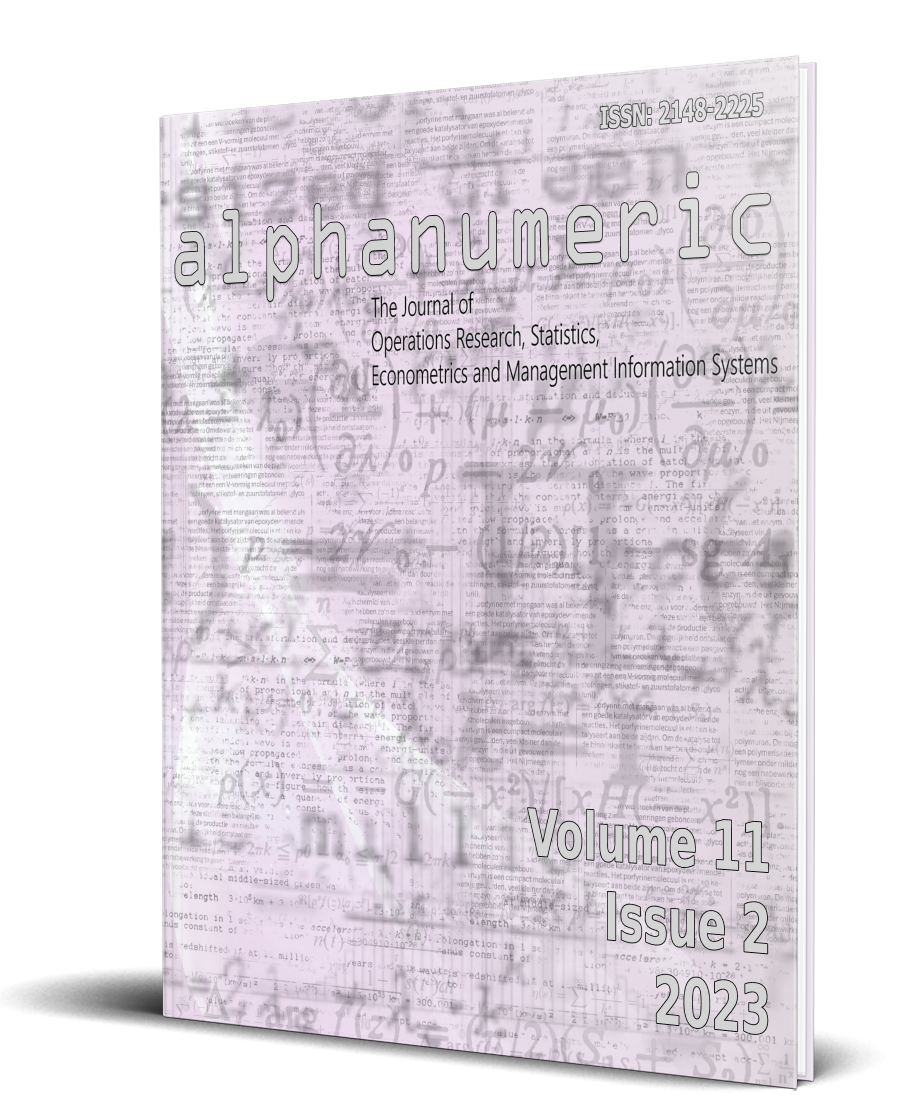
alphanumeric journal
The Journal of Operations Research, Statistics, Econometrics and Management Information Systems
Time Series Prediction with Digital Twins in Public Transportation Systems
Abstract
Classical traffic and transportation control centers must be more robust with the rapid spread of electric, intelligent, autonomous, and software-defined vehicles. Existing traffic management strategies have significant drawbacks in public safety, predictive maintenance, tuning the core functionality of vehicles, and managing mobility. We can renovate this system with next-generation intelligent Digital Twin (DT) technologies. This research proposes a time-series prediction system through Digital Twins to manage the public transportation system with Facebook’s Prophet. This study presents a model framework to build a Digital Twin application in Intelligent Public Transportation Systems and uses a public data set to validate the model with Facebook’s Prophet library by forecasting metro line passenger flows. According to the results, the Mean Absolute Percentage Error (MAPE) is 0.017 for a 1-day horizon.
Keywords: Digital Twin, Intelligent Transportation Systems, IoT, Time Series Prediction
Jel Classification: C46
Suggested citation
(). Time Series Prediction with Digital Twins in Public Transportation Systems. Alphanumeric Journal, 11(2), 183-192. https://doi.org/10.17093/alphanumeric.1402897
References
- Daraghmeh, M., Agarwal, A., Manzano, R., & Zaman, M. (2021, 14-23 June 2021). Time Series Forecasting using Facebook Prophet for Cloud Resource Management. 2021 IEEE International Conference on Communications Workshops (ICC Workshops),
- Erturk, M. A., & Vollero, L. (2020, 13-17 July 2020). GSP for Virtual Sensors in eHealth Applications. 2020 IEEE 44th Annual Computers, Software, and Applications Conference (COMPSAC),
- Fahim, M., Sharma, V., Cao, T. V., Canberk, B., & Duong, T. Q. (2022). Machine Learning-Based Digital Twin for Predictive Modeling in Wind Turbines. IEEE Access, 10, 14184-14194. https://doi.org/10.1109/ACCESS.2022.3147602
- Ivanov, S., Nikolskaya, K., Radchenko, G., Sokolinsky, L., & Zymbler, M. (2020, 17-19 Nov. 2020). Digital Twin of City: Concept Overview. 2020 Global Smart Industry Conference (GloSIC),
- Jalali, S. M. J., Ahmadian, S., Kavousi-Fard, A., Khosravi, A., & Nahavandi, S. (2022). Automated Deep CNN-LSTM Architecture Design for Solar Irradiance Forecasting. IEEE Transactions on Systems, Man, and Cybernetics: Systems, 52(1), 54-65. https://doi.org/10.1109/TSMC.2021.3093519
- Jha, B. K., & Pande, S. (2021, 8-10 April 2021). Time Series Forecasting Model for Supermarket Sales using FB-Prophet. 2021 5th International Conference on Computing Methodologies and Communication (ICCMC),
- Liao, S., Wu, J., Bashir, A. K., Yang, W., Li, J., & Tariq, U. (2022). Digital Twin Consensus for Blockchain-Enabled Intelligent Transportation Systems in Smart Cities. IEEE Transactions on Intelligent Transportation Systems, 23(11), 22619-22629. https://doi.org/10.1109/TITS.2021.3134002
- Oeschger, G., Carroll, P., & Caulfield, B. (2020). Micromobility and public transport integration: The current state of knowledge. Transportation Research Part D: Transport and Environment, 89, 102628. https://doi.org/https://doi.org/10.1016/j.trd.2020.102628
- Sabatini, A., & Vollero, L. (2022, 27 June-1 July 2022). Graph Signal Processing for IoT Sensor Networks. 2022 IEEE 46th Annual Computers, Software, and Applications Conference (COMPSAC),
- Taylor Sj, L. B. (2017). Forecasting at scale. PeerJ Preprints 5:e3190v2. https://doi.org/10.7287/peerj.preprints.3190v2
- Toharudin, T., Pontoh, R. S., Caraka, R. E., Zahroh, S., Lee, Y., & Chen, R. C. (2023). Employing long short-term memory and Facebook prophet model in air temperature forecasting. Communications in Statistics - Simulation and Computation, 52(2), 279-290. https://doi.org/10.1080/03610918.2020.1854302
- Tzachor, A., Sabri, S., Richards, C. E., Rajabifard, A., & Acuto, M. (2022). Potential and limitations of digital twins to achieve the Sustainable Development Goals. Nature Sustainability, 5(10), 822-829. https://doi.org/10.1038/s41893-022-00923-7
- Wang, Z., Gupta, R., Han, K., Wang, H., Ganlath, A., Ammar, N., & Tiwari, P. (2022). Mobility Digital Twin: Concept, Architecture, Case Study, and Future Challenges. IEEE Internet of Things Journal, 9(18), 17452-17467. https://doi.org/10.1109/JIOT.2022.3156028
2023.11.02.MIS.02
alphanumeric journal
Pages 183-192
Received: Dec. 10, 2023
Accepted: Dec. 31, 2023
Published: Dec. 31, 2023
2023 Ertürk, MA.
This is an Open Access article, licensed under Creative Commons Attribution-NonCommercial 4.0 International License.

scan QR code to access this article from your mobile device
Contact Us
Faculty of Transportation and Logistics, Istanbul University
Beyazit
Campus 34452 Fatih/Istanbul/Türkiye
Bahadır Fatih Yıldırım, Ph.D.
editor@alphanumericjournal.com
+ 90
(212) 440 00 00 - 13219
alphanumeric journal
alphanumeric journal has been publishing as "International Peer-Reviewed Journal" every six months since 2013. alphanumeric serves as a vehicle for researchers and practitioners in the field of quantitative methods, and is enabling a process of sharing in all fields related to the operations research, statistics, econometrics and management informations systems in order to enhance the quality on a globe scale.

